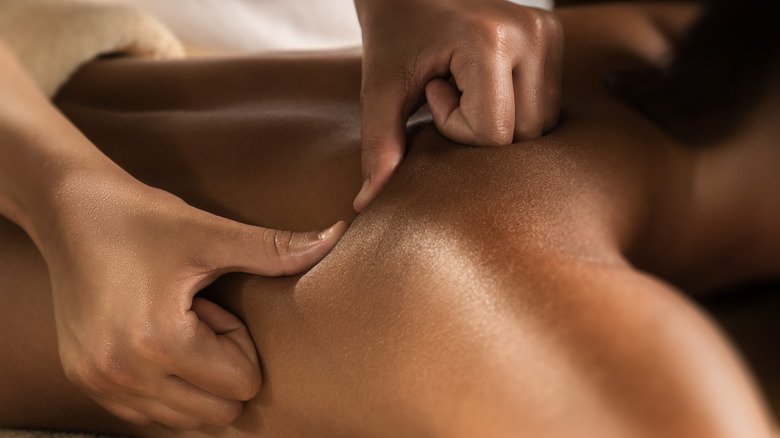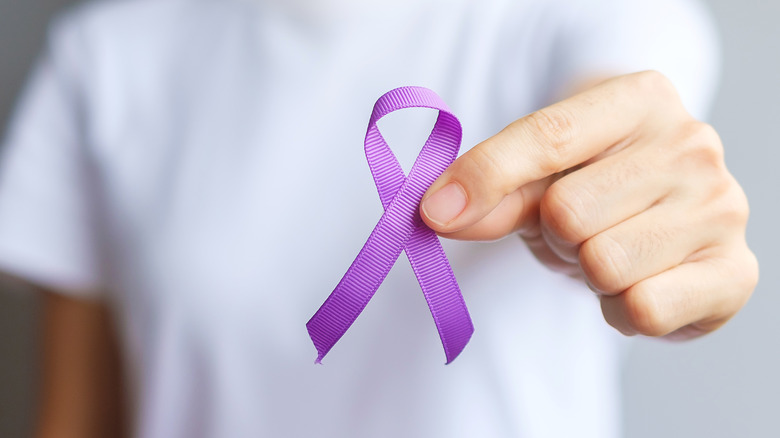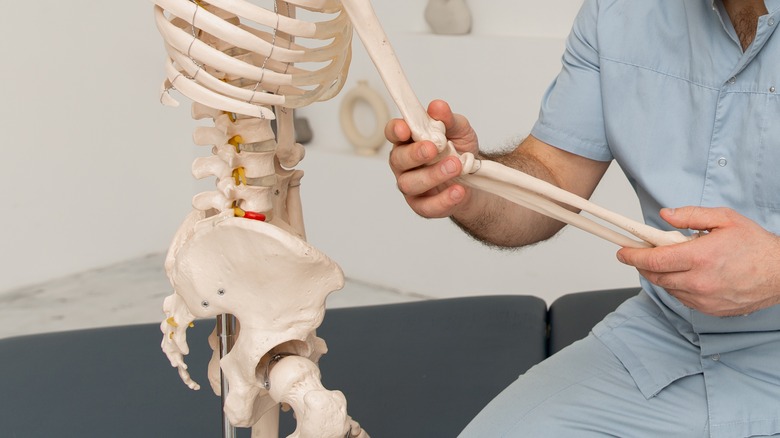What Happens To Your Body When You Get A Deep Tissue Massage?
We can tell that you've had a busy few weeks. We think that it's time for you to relax. And what better way to do that than with a massage? Getting a massage is one of life's true treats, and aside from feeling really, really good, massage therapy has a range of potential health benefits. Massages are especially good for reducing muscular tension and soreness, bringing down anxiety and stress levels, and may even have positive benefits to your blood pressure and circulatory health, explains the Mayo Clinic. These additional health benefits, alongside massages being a generally pleasurable experience, are partly why the massage industry remains so lucrative, with a market size of approximately $17.7 billion in 2023 (per Ibis World).
Importantly, though, massages are not all the same. There are multiple different styles of massage, from lighter treatments to therapies that target more embedded parts of the body. And deep tissue massage is a massage that you'll likely not forget in a hurry. Targeting, as you might expect from its name, the deep tissues in your body, this style of massage uses firm pressure to reach your lowest muscles and connective tissues, intending to assist rehabilitation from injury and relieve pain. But how does deep tissue massage actually work, and what happens to your body when you have one? We've got all the answers right here.
How does deep tissue massage work?
While all massage styles are pretty hands-on, a deep tissue massage takes this to the next level. Deep tissue massage seeks to work on your deep muscles, tendons, and other connective tissues, often to reduce pain or restore function after an injury, according to Healthline. After spending some time warming up your body with more gentle massage movements, deep tissue massage therapists use continuous, slow pressure to go beyond the outer layers of your tissue, and reach the intended areas underneath, where a build-up of scar tissue can often contribute to physical difficulty or soreness. Depending on where you need the most attention, a deep tissue massage may be isolated to one part of your body, or be a full-body experience.
The intended use of deep tissue massage as a style that primarily provides physical benefits over mental ones is what sets it apart from other massage therapies, like Swedish massage, which is a lighter massage treatment that focuses on easing stress. In this respect, it's tempting to view deep tissue massage as a slightly more functional style, but it's important to remember that there are associated mental health benefits that shouldn't be discounted. Crucially, though, you shouldn't go into a deep tissue massage expecting a gentle experience — it's designed to work your body.
Your blood pressure gets lower
Although many of the effects of a deep tissue massage are felt fairly quickly, some may be more subtle, while remaining just as beneficial. And your blood pressure lowering could be one of these effects. A study published in The Journal of Alternative and Complementary Medicine examined the impact of deep tissue massage on blood pressure, with over 260 volunteers taking part. The researchers found that following the delivery of a 45- to 60-minute massage, the participants demonstrated lower blood pressure across the board, as well as a reduced heart rate.
A further study, published in Physical Education of Students, found a similar result when examining the effects of partial sports massages on blood pressure and heart rate. The reason for these reductions appears to be partly thanks to massage therapy's ability to reduce stress and tension, which thereby eases stress on your heart and blood vessels and helps things move a little easier, explains Healing Hands School of Holistic Health.
The pressure around your nerves eases
Our nerves play a vital part in the healthy function of our body, from more visible ways like helping to move our muscles to less immediately noticeable ways like contributing to digestion (per the Cleveland Clinic). But nerves can also tend to become pinched and trapped, and when this happens, knock-on issues like sciatica and lower back pain can cause significant irritation (via Bend Total Body Chiropractic).
A deep tissue massage, however, can be a great way to tackle this. One of the effects of a deep tissue massage is that the therapy can ease tension in muscles and tissues that might be pressing on nerves and causing lower back pain. This benefit was demonstrated in a study published in The Scientific World Journal, which compared the impact of deep tissue massage to using non-steroidal anti-inflammatory drugs like ibuprofen in the treatment of chronic lower back pain. The study found that treating lower back pain with deep tissue massage therapy was as effective as combining massages with taking anti-inflammatory medication. The participants also found that their general back function also improved.
The massage helps increase blood flow, which helps injuries heal
When you have a deep tissue massage, any injured muscles generally feel a pretty significant benefit — but how does that benefit occur in the first place? It's largely down to the increased blood blow that happens thanks to the massage. The very act of pressing on and massaging muscles stimulates more blood flow to the touched areas, which then increases the temperature in the tissue, states Physio.co.uk. When this happens, muscles and tissues can become more flexible and relaxed, which then stops knots from forming and allows the injury to start to heal.
This healing is enabled by the additional oxygen and nutrients that are delivered when blood flow increases. Blood flow is particularly stimulated by the kneading motions administered by your massage therapist. When these nutrients get to your damaged muscles, they allow them to repair faster, and this, in turn, reduces pain and restores function. It's amazing what a little bit of massaging can do, huh?
Your scar tissue breaks down
Our bodies are pretty amazing at repairing themselves, as anyone who's ever watched a cut scab over and heal can attest to. But that repair also happens on a lower level, when we injure our muscles. If your muscles become torn or damaged, either through an injury or as a result of surgery, your body responds by forming collagen fibers, which build around the affected area to create scar tissue (via Physio.co.uk). While this is effective in knitting damaged tissue together, scar tissue can also be pretty rigid, and this can create issues with movement and function. Scar tissue can also produce additional and lasting pain from injuries.
When you have a deep tissue massage, though, your massage therapist will seek to reduce the amount of scar tissue on your muscles by applying solid, continuous pressure. This pressure is often delivered to specific areas, through acupressure or the "frictions" technique, which targets the tissue and delivers blood flow and oxygen to the area. All of this helps to realign the collagen fibers and slackens scar tissue, giving rise to increased flexibility and reducing pain.
Your mind may become calmer
Having a deep tissue massage is unlike other more gentle treatments, and at times, you may find yourself cursing your massage therapist for all the pushing and prodding. But once you get past that, we're willing to bet it'll also make you feel pretty zen. Although deep tissue massages are primarily aimed at making your muscles feel better, they can also offer benefits to your mental health, and potentially lower stress and feelings of anxiety and depression, notes Medical News Today.
But how, and why, are massages so relaxing? It all comes down to hormone release, explains Physio.co.uk. The pressure and kneading motion that's delivered during a deep tissue massage stimulates additional blood flow, and simultaneously the automatic nervous system is kicked into action. As your automatic nervous system ramps up, your brain responds by releasing additional "feel-good" hormones, or endorphins, like serotonin and dopamine. It's these endorphins that have such a powerful effect on your mental state, calming the mind and making you feel altogether more positive. Using deep tissue massage for endorphin release can be helpful for certain situations, like before a particularly stress-inducing event, or if you just wanna feel a little more relaxed generally.
The deep tissue action can ease arthritis
It's easy to assume that the muscle-focused action of massage therapy won't have much of an impact on the symptoms of arthritis, a condition that affects the joints. But that's where you'd be wrong, folks. Deep tissue massage can be useful for people with arthritis, explains licensed massage therapist and The Woodhouse Day Spa's director of operations Jonathan Wills via Live Science. As well as helping to improve general mobility in the muscles and tendons, which may then assist joint function, massage therapy is also effective in reducing stress and tension, which may have a beneficial effect on arthritis symptoms like pain or inflammation.
Other massage styles, like sports massage or hot-stone therapy, may also be beneficial for arthritis, says Wills. When it comes to deep tissue massage, however, it's important to play it safe. As a massage style that uses particularly strong pressure, it can have a harder impact on the joints and may inadvertently make arthritis symptoms worse. The same thing can occur with sports massage. If you have arthritis, it may be useful to discuss the benefits of deep tissue massage with your doctor before booking one, or else go for a lighter massage style like reflexology, hot stone therapy, or a Swedish massage instead. These treatments still provide the stress-relieving benefits that a deep tissue massage will, without the hardcore pressure on your muscles and tendons.
If you're pregnant, deep tissue massage can manage symptoms
Pregnancy can produce a range of accompanying symptoms, and lower back pain can be one of them, particularly early on, states the National Health Service. The ways to manage this lower back pain can often be through physical activity or therapies, and deep tissue massage may be an especially effective course of treatment (per Medical News Today). In one case study, published via ResearchGate, a pregnant person received a deep tissue massage twice weekly for six weeks, during which the patient was lying on her side, and pressure was delivered to the painful area. It was found that after the course of massage therapy was completed, the lower back pain was less intense.
The pain relief may be down to the release of endorphins that happens during and after a deep tissue massage, which potentially reduced the aches felt in this case study. The researchers conducting the study noted that the positive outcome from the deep tissue massage may mean that it could be a viable therapy for pregnant people with lower back pain, and reduce the need to take medication like ibuprofen to manage it. The endorphin release from deep tissue massage could also have the side effect of reducing general stress during pregnancy.
Your body can become sore afterward
"Ow! Ouch! Ahh!," is the sound that would generally emanate from our treatment room during a deep tissue massage. Look, those things are good for you, but they can hurt, too. But what may be surprising is how much your body can ache after a massage, says Healthline. Residual soreness and aching can occur following a deep tissue massage and occasionally persist for a few days. This is generally common, so there's nothing to worry about too much — it's simply a consequence of your muscles being worked so hard, causing tiny tears in the tissue, similar to what happens when you do a really hard workout (via The Massage Centre).
Luckily, these aches and pains will generally go away relatively quickly, and within a few days, you'll be feeling normal again. If you're feeling really sore, applying topical remedies like a hot compress can soothe your muscles, as well as staying hydrated and avoiding particularly strenuous activities. It should be said, though, that while a little pain is normal, it's not something you have to feel for the massage to be effective. Additionally, if your pain is particularly acute, localized, or doesn't go away after a few days, it's worth checking in with your doctor to make sure that there's not been any lasting damage or injury.
People with fibromyalgia may feel relief
If you have fibromyalgia, you'll likely be well aware of the ways it can disrupt day-to-day life, with the persistent pain and fatigue that are symptoms of the condition potentially upsetting your routines or work (per the Mayo Clinic). Finding ways to manage fibromyalgia is therefore really important, and interestingly, getting a deep tissue massage may be a useful course of action.
A study published in Rheumatology International examined the effects of connective tissue massage on fibromyalgia symptoms in women when administered alongside exercise. It was found that although doing exercise on its own proved to be useful for improving levels of fatigue, pain, and insomnia, when it was accompanied by connective tissue massages, symptoms were reduced even more.
A further review, published in PLoS One, noted the benefits of massage therapy more generally when it comes to fibromyalgia symptoms. In this review, it was concluded that the benefits are not just around physical health, but massages also seemed to reduce anxiety and depression that existed alongside, or potentially due to, the condition. The review's researchers recommended that longer-term studies on the effects of massage therapy for fibromyalgia symptoms should be conducted.
Your bones may be affected
If you've ever had a massage, we're willing to say you're probably not thinking about your bones (it's far more likely you're wondering how your massage therapist developed their unparalleled hand strength — honestly, those folks are impressive). But next time you have a deep tissue massage, your skeleton might thank you. One of the key benefits of deep tissue massage is easier-moving muscles, and this in turn reduces your risk of bone injury, states Today's Chiropractic Clinic. The additional manipulation of your body and reintroduction of movement could help reduce osteoporosis risk and keep your bones strong.
However, if you have osteoporosis, it's highly recommended that you seek advice from a healthcare professional before booking a deep tissue massage. As bones affected by osteoporosis are weaker, especially hard pressure could result in a fracture, warns Healthline. You may also wish to be cautious if you have a condition that weakens your bones in another way — like certain forms of cancer, as well as lupus or fibrous dysplasia — and makes you more susceptible to fracture (per WebMD).
You may feel sustained discomfort
Look, nobody said that deep tissue massages are a walk in the park, folks. And while you may feel particularly good afterward and reap the benefits to injured muscles, during your massage you may be a little uncomfortable, explains Medical News Today. It's important to know when this discomfort is normal and due to the deep pressure from the massage, and when it's because of something else. If you have a pre-existing issue in one part of your body, for example, a deep tissue massage could trigger it, so it's important to discuss your physical health with a massage therapist before starting a treatment.
It's also worth bearing in mind that in some situations, deep tissue massages are best avoided entirely. If you've had a surgical procedure recently, or are undergoing cancer treatment, you may want to give the massage a miss. People with conditions that affect their blood's ability to clot could also wish to consider another form of massage. Finally, if you have any open wounds or skin conditions that make sustained physical contact tricky, it's best to avoid deep tissue massage — and if you have a skin condition that could be passed on to your therapist, like impetigo, you should wait until you're fully recovered to avoid putting them at risk (via MedBridge Massage).
What to look for in a deep tissue massage therapist
A good deep massage therapist could help alleviate pain from injuries significantly, but how do you know that you've found the right one? The first thing you need to establish is how experienced they are in deep massage therapy specifically, advises Healthline. Given that there are multiple different styles of massage, your chosen therapist may be more comfortable with other treatments, and it's important to go with a deep tissue massage expert, who has a proven track record delivering this style.
It's also worthwhile to ask about their massage therapy license. Most locations will require massage therapists to have certification and a license to practice, and if they can't produce one or evade your questions, you should go elsewhere. If you're seeking deep tissue massage for an injury, it's useful to note that some healthcare providers may cover it under their healthcare plans, and you should speak with both your insurance provider and your massage therapist about this before putting any money down.














